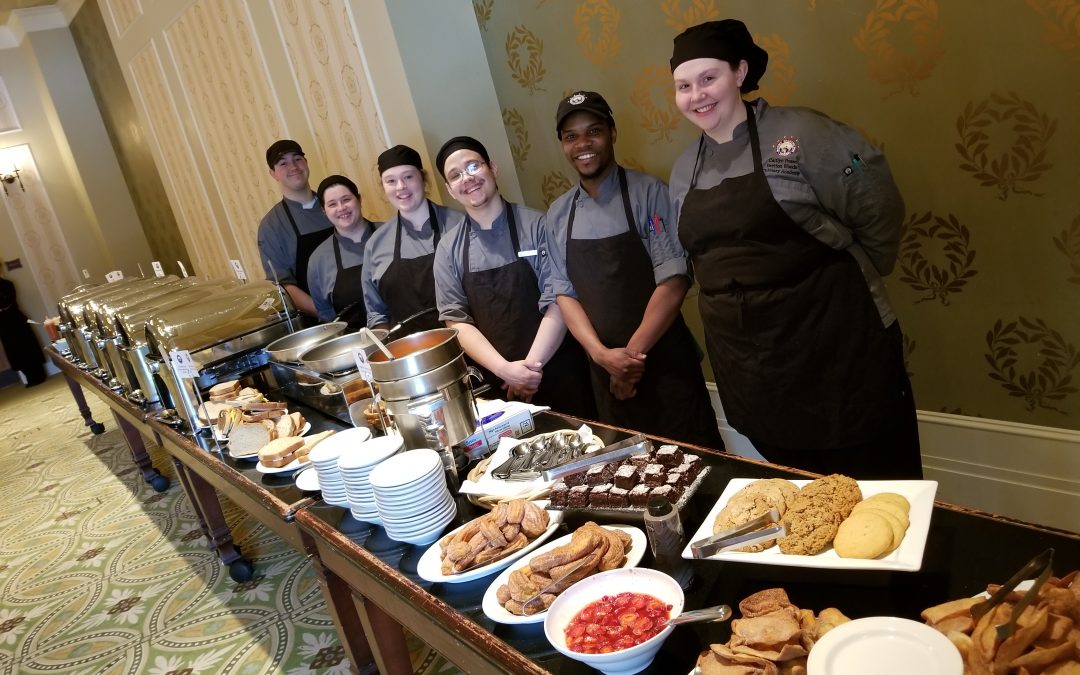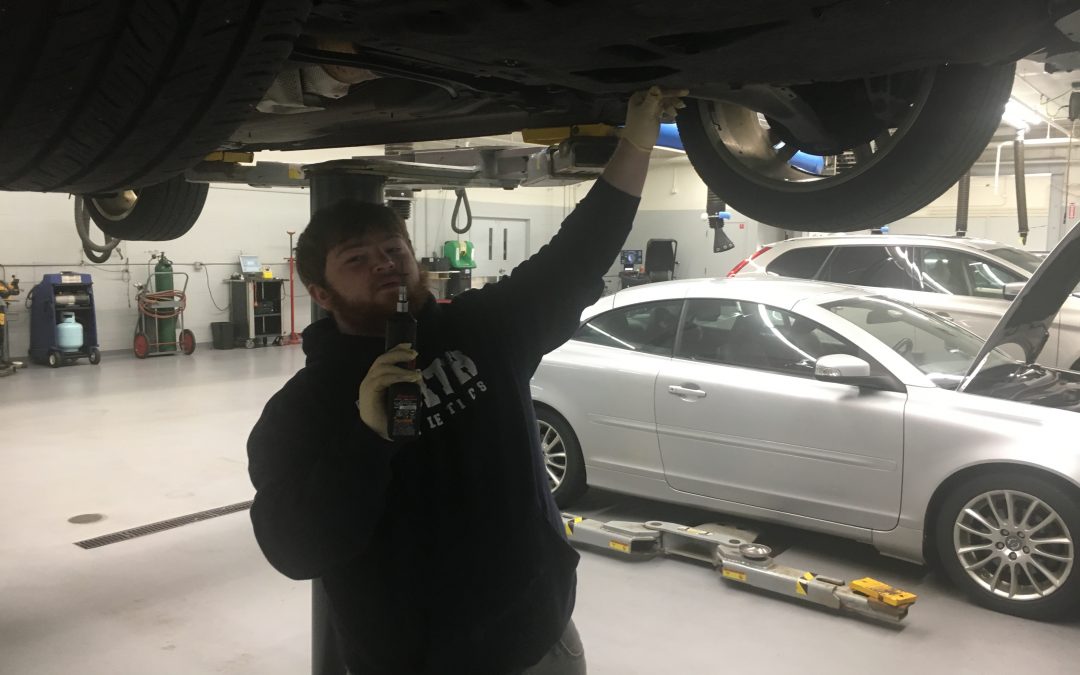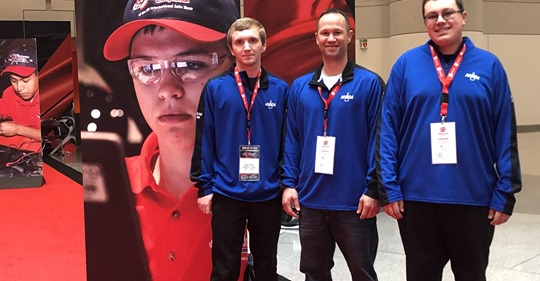
Aug 9, 2019 | Impact, Teachers
While English is often viewed as a stand-alone academic subject, Beth York, English teacher and reading specialist at Concord High School, said it is time to rethink that paradigm.
“Most people in the working world will be using their literacy to persuade, inform, instruct, remedy, or collaborate in order to achieve a goal,” she said.
Citing many high school English teachers as “very good” at teaching persuasive, informative and narrative writing and speaking as well as careful, analytic reading of great literature, York said she and other Concord English teachers have been trying a new approach.
“Through Career Communications class, we are striving to place student literacy instruction into contexts they will one day encounter in the workplace,” she said.
While students typically associate English class with novels, films and poetry, York said the reality is that they will spend their days in the workplace leading meetings, engaging with customers, or drafting content for stakeholders.
“They will use their literacy skills to ask for raises or promotions and to direct their professional lives,” said York. “The classroom and workplace experiences should not be so distinct.”
She said great novels, poems, films and essays still have their place, however, as she noted they make us better thinkers and human beings.
“Reading rich, honest storytelling makes us more empathetic and enables us to engage more fully with the world and with each other,” she said. “We need to keep these inspirational aspects of literacy instruction while adding the more aspirational ones.”
These aspirations aspects will assist students in learning how to persuade or negotiate in the workplace using audience awareness and sound reasoning.
“Once in the workplace, they won’t often write five paragraph essays, but they will need to understand how to adjust the structure, tone and content or their writing to effectively reach particular audiences for particular purposes,” she said.
With these ideas in mind, York said Steve Rothenberg, Concord High School’s CRTC Director asked her to collaborate with him and other English teachers to design and launch Career Communications.
“I immediately signed on,” she recounted.
Designed with an optional ½ credit Extended Learning Opportunity (ELO), the course is comprised of classroom time learning, practicing and demonstrating English skills, research and a project in the field or outside of class.
“In this class, I hope to help students develop literacy skills and habits that can support their future workplace success,” said York.
Success in the course is defined across 5 core competencies.
Competencies:
- Reading: Students will demonstrate the ability to comprehend, analyze, and critique a variety of increasingly complex print and non-print informational texts.
- Writing: Students will demonstrate the ability to write different texts for different purposes, including reasoned arguments backed by evidence, informative texts conveying complex ideas, and narratives.
- Research: Students will demonstrate the ability to locate, compile, organize, analyze, integrate and present topical information.
- Speaking, listening and viewing: Students will demonstrate the ability to listen and view critically and to speak purposefully and effectively for a variety of purposes.
- Technology: Students will demonstrate the ability to use multiple forms of technology, including digital media and the Internet, to access, evaluate, organize and communicate information.
The goal of the course, noted York, is “to enable students to positively impact their future workplace and to further their own career through the skillful application of effective reading, writing and interpersonal communication strategies.”
To prepare to teach the course, she said she spent time interviewing industry professionals in fields relevant to her CRTC students’ programs, listening to CRTC colleagues and reading everything relevant [she] could get [her] hands on.”
“I interviewed several industry professionals, including the Director of Human Resources from Concord Hospital, a local fire captain, the service manager of a large auto dealership, a police detective, the president of a large construction firm, two salon owners and others.
“I wanted to learn about the literacy skills they use daily, the materials they read to stay up-to-date in their fields, and the skills and qualities they look for in new hires,” she said. “These conversations and experiences helped me to create a framework for teaching this course.”
Through this research, she said she was able to recognize universal skills common to each workplace.
“In all career fields, we will need to inform and persuade,” she said, “and there are universal strategies for doing so effectively and in a manner that will generate return customers or support collegial relationships.”
York also found several skills unique to each workplace.
“The audience and context within which a police officer or EMT works is different from that of a graphic designer or chef,” she explained. “Students need to practice applying skills flexibly with consideration of the contexts and audiences they will likely encounter in the field.”
For York, the course underscores something that should be fundamentally understood in today’s education model.
“I believe that our ability to read, write and speak effectively serves as our bridge to the wider world,” she said. “It is how we how we come to understand, engage with and sometimes shape our society.”
In part two of this two-part series, we look more closely at Career Communications at CRTC.

Jul 4, 2019 | Industry, Leadership, Programs
There are many pathways into a career, which underscores New Hampshire Lodging and Restaurant Association’s role in Carroll Academy, an adult high school program in Tamworth, NH.
“In this current workforce climate, you need to look into every possible resource and partnership,” said Amie Pariseau of New Hampshire Lodging and Restaurant Association (NHLRA).
Whereas much of her work consists in partnering with New Hampshire Career and Technical Education Centers, Pariseau said she saw an opportunity with Carroll Academy, which has resulted in Introduction to Hospitality.
Aimed at adults who do not have their diploma or HiSET (high school equivalency like the GED), the program is collaborative in nature, according to Crystal Sawyer, director of Carroll Academy/Carroll County Adult Education.
“I was approached in May of 2018 by Amie and Christina Baker from the Mount Washington Omni Hotel, to see if I would be interested in teaching a certified Hospitality course,” she explained.
In September of 2018, Sawyer said Michelle Hart from NHWorks indicated they could partner with the group and could pay for the class for any student eligible for a Basic Skills grant.
“If the student was making under $15 and was looking for a job in hospitality, they could take this beginner’s Hospitality class,” said Sawyer. “NHWorks would also help them find a job after the class in the field.”
In designing the certified class, Sawyer chose the AHLEI START (Skills, Tasks, And, Results, Training) 180-hour Curriculum Program. The START Program, she explained, is basically an introduction to every position in the hospitality sector — Front Desk Representative, Security, PBX Operator, Bell Attendant, Maintenance, Laundry, House Keeping, Food and Beverage, etc.
“At the end of the course, the student takes a final,” he said. “If they pass that, they get a START Certificate that they can show an employer.”
Noting the first class ran once each week with three recent graduates, Sawyer said Carroll County Adult Education is the first Adult Education center in the state to teach this certified AHLEI START course.
“We also have an Articulation Agreement with White Mountains Community College stating that our Hospitality course is considered a 3 credit course for their Introduction to Hospitality program,” she said.
Students in the class are diverse.
“I have an ESL student that has been with us for years and would like to switch career paths,” said Sawyer. “Another student is a former HiSET graduate who works in hospitality and would like to move up the ladder with her certificate.”
According to Pariseau, NHLRA could not be more excited about the possibilities for the program.
“We hope to see it grow and taught at other centers,” she said.
Currently, Pariseau said there are in fact plans for Manchester Adult Education to role out a similar program this fall.
Regarding the program at Carroll Academy/Carroll County Adult Education, which may soon include an apprenticeship track, she said students receive much more than an introduction to the hospitality industry.”
“They are receiving a nationally recognized certificate and a pathway to continue their education if they choose to do so,” she said.
In looking ahead at NHLRA’s role in general, Pariseau stated, “We will continue to support the efforts of all of our education partners as we look to continue to build a workforce pipeline and support current workforce needs of the industry.”
To learn more about NHLRA, visit https://www.nhlra.com. To learn more about Carroll Academy, visit https://www.carrollacademy.net.
.

Jun 20, 2019 | Industry, Programs
To meet the workforce demands, Omni Mount Washington Resort has developed Bretton Woods Culinary Academy (BWCA) in partnership with White Mountains Community College (WMCC) and the NH Department of Labor.
A 3-year program, BWCA allows students to enroll in WMCC to work on their Associates Degree in Culinary Arts and attend classes at Omni.
“They work with chefs on property and learn about different subjects to cooking,” said Joseph Madzia IV, Executive Sous Chef at Omni. “The school sends their chefs here to teach the lecture classes and the students attend the school for their math and English classes.”
The program also consists of an apprenticeship in which students work full-time and receive compensation.
“They get to move around the resort in different positions learning from all of our wonderful chefs, supervisors, and fellow cooks,” said Madzia, who stressed the importance of the program.
“The students are our future,” he added. “We take the time to teach them so they are ready for a job. We want to see these students graduate and go onto higher positions leading their own team.”
He said their goal is to not just teach them culinary basics, but provide them with a strong foundation to continue their career with Omni.
“We hope the training they receive from us will offer them better job opportunities since they will finish with an Associate’s Degree, 3 years work experience and completion of an Apprentice Program,” he said.
For Madzia, the apprenticeship aspect of the program is particularly important, which said they customize to suit their needs at Omni.
“The students are taught all the basics and advanced skills they would get if they attend the school but the 3 years of experience helps jump start their career,” he explained. “We use this opportunity to cover all the standards the college would teach but go more in-depth with standards our specific hotel follows.”
He said program graduates are great candidates for the Omni brand, which enable them to immediately hire them into positions that directly impact the workforce shortage.
“We have been partnered with the NH Department of Labor in efforts to maximize this program to support our state,” said Madzia. “This program is an interesting way to think outside the box to find and train new chefs.”
In reflecting on the strength and relevance of BWCA, Madzia contrasted it with his own experience as a student and aspiring chef.
“I attended a culinary school where I spent two years attending class full time,” he said. “I needed to pick up a part time job so I had money, but the jobs I had were not the best. I didn’t get to use that work experience on my resume after because some of the jobs I had were simple.”
He said BWCA, however, provides both educational and hands-on training as well as networking opportunities that often help open doors.
“If the students put a little money from each paycheck aside on their own, they can pay for their classes as they go and be debt free from school at the end,” he said.
Currently, BWCA has six students with two starting their third year and graduating in May of 2020.
“We are very excited for this class’s graduation, because it will be our first one,” Madzia said. “We wish them great success in this career. The other four students will graduate in May 2021.”
BWCA is currently accepting applications for incoming freshmen. To learn more, visit https://www.brettonwoods.com/bwca.

May 30, 2019 | Internships, Programs
While we live in a digital age, there is no substitute for hands-on, work-based learning, which is why staff at Nashua Technology Center (NTC) are pushing to ramp up internships in its Automotive Technology program.
Citing approximately 400 job openings for automotive technicians in the state, NTC Director Amanda Bastoni said it is not enough, however, to offer just any kind of internship to students or industry partners.
“We used to send all of the students out on internship for a full semester, but that model wasn’t working,” she said. “It may have been successful at one time, but dealers started saying that kids weren’t showing up and it was really hard to manage. We knew we needed to make a change.”
This change consisted in reducing the time for internships to one month. She said students now go out Monday to Thursday and come back on Friday to discuss their respective experiences with the teacher.
“It has worked so well,” said Bastoni, who said a lot of preparation went into this programmatic change.
“Our teacher taught the students how to do job interviews, while I, as CTE Director, had all the kids do a survey,” she said.
This survey consists of questions that relate to the local dealership preferred by students as well as their objectives and commitment level to the internship itself.
“Not all students were allowed to participate,” she said.
Bastoni said she also personally interviews students now and provides feedback regarding their interview skills, all of which helped to determine where to place them.
“We made sure the kids who went into the internships really wanted to make this a career,” she added.
Students appreciate the internship model, too.
Senior Christian Belonga, who currently interns at MacMulkin Chevrolet in Nashua, said his internship has helped him realize what it would actually be like to work in the field.
“I like the placement because it gives me that real world experience and it is hands on,” he said. “I have quit my job at Market Basket and now want to work with cars in dealerships.”
Senior Jordan Smith just received a job offer from Tulley Buick GMC.
“I love working with the guys there — I feel absolutely prepared,” he said. I have been doing tires, exhaust, oil changes. Without this class, I wouldn’t know what I wanted to do after school.”
As for how it benefits industry partners, Bastoni said it not only provides dealerships with immediate help, it helps build a pipeline for future employment.
“It gives the dealers a chance to see if the kids are good fit,” she said. “It helps establish a nice relationship between dealers and students.”
According to Bastoni, the effort put into revamping their internship model within Automotive Technology reflects a statewide trend at all CTE centers.
“Internships are such a good idea,” she said. “Research tells us that kids that go into an internship are more likely to go into that industry. It is really good preparation.”
The only caveat is that students must recognize that these are places of business.
“We need to make sure when we send students out that we really support them,” she said. “I will continue to personally interview students before they go out until I really feel like a streamline process has been created.”
To learn more about NTC or Automotive Technology, visit https://nsd-schools.nashua.edu.

May 16, 2019 | Industry, Programs
Recently, Aaron White and Sheamus Powers, students in Portsmouth High School Career Technical Center’s Automotive Technology program, placed 7th in the nation at the National Auto Tech Championship in New York City.
The achievement, according to Portsmouth Career Technical Education (CTE) Director Diane Canada, helps underscore not just the strength of the program, but its relevancy to – and partnership with – industry.
“We have been accredited by the National Automotive Technicians Education Foundation (NATEF) since 2008,” she said.
This accreditation includes a close working partnership, one that is replicated at all CTE centers across the state.
“I work with all the high school and colleges,” said Jessica Dade, NATEF Assistant Executive Director and Career Coordinator. “I make sure there is a pipeline between the technicians and all the other students that are employed by the auto industry. I help create the pathway from high school and college directly into the industry.
This pathways, she said, leads to hundreds of different opportunities – from auto technician to marketing and accounting.
“It is a fast growing and high-tech industry,” she said. “It is a great career pathway for anyone.”
Such support from NATEF as well as from the New Hampshire Automobile Dealers Association (NHADA) is critical, according to David Lily, who teaches in Automotive Technology at Portsmouth High School.
“With support from the NHADA and the NH community college system, our students have everything they need to start a successful career,” he said.
In the case of White and Powers, this career has a boost from NHADA, which awarded them scholarships as a result of their success at the National Auto Tech Championship.
In the case of White, his scholarship will go toward his degree at the Toyota T-Ten Program at Lakes Region Community College. Powers’ scholarship will be applied toward covering the costs to take the Ford Asset Program at Manchester Community College.
They are both working at NHADA member stores.
“Sheamus is at Hampton Ford and Aaron at Toyota of Portsmouth,” said Dade, who said it is a huge honor for everyone involved in their respective success.
“They are rated within the top 14 auto students in the country,” she said. “It shows that hard work and determination can really pay off. It really humbles you when you see 18 year-olds work so very hard. It is very rewarding seeing it come full circle for them.”
Lilly agrees and said he hopes one takeaway from his students’ accomplishment is a deeper understanding as to what takes place in CTE in general and his program in specific.
“People who are not aware of what current CTE programs offer don’t realize what high level training students are receiving,” he said. “It’s not only from a technical aspect on the cars, but also using the repair software and the technical reading and writing involved.”
He said students are problem-solving every day using industry tools and resources in Automotive Technology at Portsmouth High School Career Technical Center.
“The thought that students are just learning to change oil and tires could not be further from the truth,” he said.
To learn more about Portsmouth High School Career Technical Center, visit portsmouthcte.com.





